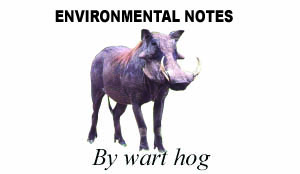 Sustainable development began to gain ground as a concept within the last 25 years with the development of ICDPs from the mid-1980s.
Sustainable development began to gain ground as a concept within the last 25 years with the development of ICDPs from the mid-1980s.
It can be defined in several different ways, but a major characteristic is that it is seen as development that meets the needs of the present without compromising the rights of future human generations.
However, it is clear that economic development in the industrialised world threatens not only the rights of future generations of their own national citizens, but also the existing rights of much of the pre-industrialised world.
Global warming, caused to a large extent by the burning of fossil fuels in the developed world, affects not only the developed world but also the very existence of some countries comprising lowering island archipelagos such as the Maldives. Yet sustainable development is perceived as a prescription for rational development by others. Sustain- able development in its traditional formulation does not have much relevance to the behaviour of industrialized nations and their consuming habits.
Sustainable development effectively seems to mean, in the majority of cases, development in the rural and/ or agricultural sectors of the developing world which will provide consistent, modest income derived from the non-destructive exploitation of the natural resource i1ase. Sustainable development programmes are often combined with ICDPs or provide the basic philosophical underpinning of ICDPs with the ultimate goal of protecting a natural resource base through involvement of the local communities in its management.
This shift in the onus of natural resource management from central governments to local communities is often seen as a progressive measure in which the local communities are empowered to manage their own natural resource base.
However, in many cases it would appear that the reason from this shift in responsibility for maintaining protected areas and the natural resource base from governments to local communities is not because of the desire of governments to empower rural communities but is forced on central governments because of their institutional and financial weaknesses.
Because personnel, budgets and logistical support for protected areas are unlikely to be available in the foreseeable future from traditional sources, the involvement of local communities in a conciliatory and co-operative approach is seen as the only viable option (Ishwaran, 1992).
This compromise means that the more that basic human needs can be met by protecting natural areas, the better the chances of survival for those areas. In contrast, many protected area staff believe that strong legislation supported by vigorous law enforcement is the best option for long-term conservation (McNeely et at., 1994).
In the industrialised world, creation of a protected area such as a national park is usually achieved through central government legislation. The park is managed by a national park service. Involvement of local communities, if it occurs, is advisory and functions to ensure better integration into the local socio-economic context. Management functions and responsibility for protection of the resource are not devolved on to the local community. A major problem with any shift in responsibility for protected area management is that the local communities have up until now been treated as the principal agents of protected area depletion (“poachers”), and prosecuted if they utilised resources from the protected area. Now they are required to become managers, often without any financial or technical assistance.
This hasty transition seems fraught with danger. One of the features of the past two decades is rapid depletion of the wildlife resource..
The rapid urbanisation that is now affecting much of sub-Saharan Africa appears to correlate with an increasing demand for bush meat and status goods made of hides or ivory.
The local communities are in many cases responding to demand from distant urban or international markets for wildlife products (Barrett and Arcese, 1995). African governments have consistently neglected the rural farmers in favour of the interests of the politically powerful urban dwellers, who are capable of causing civil disturbances (Timberlake, 1985).
The abrogation of responsibility for protected area management by government and its imposition on rural communities is yet another example of political bias in favour of towns and against the rural farmers.
What is needed is a fundamental reorientation of government both towards solving rural problems and towards the responsible protection of national biodiversity.
It also indicates that traditional conservation still has a role to play. As Barrett and Arcese (1995) say, “proper equipment, training and compensation of parks staff still promise high payoffs in conservation of protected species, but have been provided in exceptionally few African circumstances
For more information contact: Wildlife & Environmental Conservation Society of Zambia, Wart Hog, P.O. Box 30255, Lusaka, Zambia.
Telefax: 260-211-251630, Cell: 0977-780770, E-mail: wecsz@coppernet.zm






